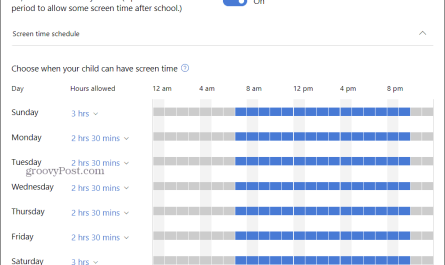In today’s fast-paced world, it is essential to teach children the importance of building healthy habits from a young age. By instilling healthy habits early on, we can set them up for a lifetime of well-being and a decreased risk of chronic diseases. In this article, we will discuss some effective ways to help children develop and maintain healthy habits.
1. Encourage Regular Physical Activity
One of the best ways to promote a healthy lifestyle in children is by encouraging regular physical activity. Physical activity not only helps children stay fit but also improves their cognitive function and emotional well-being. Encourage activities such as biking, swimming, dancing, or simply playing outside.
HTML Markup:
<h1>Building Healthy Habits in Childhood</h1>
<p>In today’s fast-paced world, it is essential to teach children the importance of building healthy habits from a young age. By instilling healthy habits early on, we can set them up for a lifetime of well-being and a decreased risk of chronic diseases. In this article, we will discuss some effective ways to help children develop and maintain healthy habits.</p>
<h2>1. Encourage Regular Physical Activity</h2>
<p>One of the best ways to promote a healthy lifestyle in children is by encouraging regular physical activity. Physical activity not only helps children stay fit but also improves their cognitive function and emotional well-being. Encourage activities such as biking, swimming, dancing, or simply playing outside.</p>
2. Limit Screen Time
Excessive screen time has been linked to various health issues, including obesity, poor sleep quality, and decreased physical activity. Set limits on the amount of time children spend watching TV, playing video games, or using electronic devices. Encourage alternative activities such as reading, art, or playing board games to reduce screen time.
3. Promote Healthy Eating Habits
A nutritious and balanced diet is crucial for a child’s growth and development. Teach children about healthy food choices and involve them in meal planning and preparation. Offer a variety of fruits, vegetables, whole grains, lean proteins, and dairy products. Limit the intake of sugary drinks and snacks high in added sugars.
4. Make Physical Activity Fun
Make physical activity enjoyable by turning it into a fun and engaging experience. Organize family outings that involve physical activities like hiking, biking, or playing sports together. Encourage children to participate in team sports or activities they genuinely enjoy. This will not only keep them active but also foster positive associations with exercise.
5. Lead by Example
Children are more likely to adopt healthy habits if they see their parents and caregivers practicing them. Be a positive role model by prioritizing your own physical activity and making healthy eating choices. Involve the whole family in meal planning and encourage shared physical activities to make healthy habits a family affair.
6. Prioritize Sleep
Adequate sleep is essential for a child’s overall health and well-being. Establish a consistent sleep routine that allows for enough sleep, based on your child’s age. Limit the use of electronic devices before bedtime and create a calm and comfortable sleep environment.
7. Teach Stress Management Techniques
Stress is an unavoidable part of life, even for children. Teach your child stress management techniques, such as deep breathing exercises, meditation, or engaging in calming activities like reading or taking a walk. Encourage open communication and provide a supportive environment for your child to express their feelings.
8. Celebrate Achievements
Recognize and celebrate your child’s achievements, no matter how small. Whether it’s finishing a sports event, trying a new vegetable, or successfully completing a physical activity goal, acknowledge their efforts and provide positive reinforcement. This will help instill a sense of accomplishment and motivate them to continue practicing healthy habits.
9. Involve the Community
Enlist the support of the community in promoting healthy habits for children. Encourage schools to provide nutritious meals and incorporate physical activity into the curriculum. Join local activities or clubs that focus on creating a healthy environment for children. This sense of community involvement will reinforce healthy habits beyond just the home setting.
10. Be Patient and Persistent
Building healthy habits takes time and consistent effort. Be patient with your child and avoid pressuring them. Keep encouraging and reinforcing positive behaviors, and remember that it’s normal for children to have setbacks. Stay persistent and keep striving to create a healthy environment that supports their overall well-being.
In conclusion, building healthy habits in childhood is crucial for a child’s long-term well-being and sets the foundation for a healthy future. By encouraging regular physical activity, limiting screen time, promoting healthy eating habits, and leading by example, parents and caregivers can help their children develop a healthy lifestyle that will benefit them throughout their lives.
HTML Markup:
<h2>2. Limit Screen Time</h2>
<p>Excessive screen time has been linked to various health issues, including obesity, poor sleep quality, and decreased physical activity. Set limits on the amount of time children spend watching TV, playing video games, or using electronic devices. Encourage alternative activities such as reading, art, or playing board games to reduce screen time.</p>
<h2>3. Promote Healthy Eating Habits</h2>
<p>A nutritious and balanced diet is crucial for a child’s growth and development. Teach children about healthy food choices and involve them in meal planning and preparation. Offer a variety of fruits, vegetables, whole grains, lean proteins, and dairy products. Limit the intake of sugary drinks and snacks high in added sugars.</p>
<h2>4. Make Physical Activity Fun</h2>
<p>Make physical activity enjoyable by turning it into a fun and engaging experience. Organize family outings that involve physical activities like hiking, biking, or playing sports together. Encourage children to participate in team sports or activities they genuinely enjoy. This will not only keep them active but also foster positive associations with exercise.</p>
<h2>5. Lead by Example</h2>
<p>Children are more likely to adopt healthy habits if they see their parents and caregivers practicing them. Be a positive role model by prioritizing your own physical activity and making healthy eating choices. Involve the whole family in meal planning and encourage shared physical activities to make healthy habits a family affair.</p>
<h2>6. Prioritize Sleep</h2>
<p>Adequate sleep is essential for a child’s overall health and well-being. Establish a consistent sleep routine that allows for enough sleep, based on your child’s age. Limit the use of electronic devices before bedtime and create a calm and comfortable sleep environment.</p>
<h2>7. Teach Stress Management Techniques</h2>
<p>Stress is an unavoidable part of life, even for children. Teach your child stress management techniques, such as deep breathing exercises, meditation, or engaging in calming activities like reading or taking a walk. Encourage open communication and provide a supportive environment for your child to express their feelings.</p>
<h2>8. Celebrate Achievements</h2>
<p>Recognize and celebrate your child’s achievements, no matter how small. Whether it’s finishing a sports event, trying a new vegetable, or successfully completing a physical activity goal, acknowledge their efforts and provide positive reinforcement. This will help instill a sense of accomplishment and motivate them to continue practicing healthy habits.</p>
<h2>9. Involve the Community</h2>
<p>Enlist the support of the community in promoting healthy habits for children. Encourage schools to provide nutritious meals and incorporate physical activity into the curriculum. Join local activities or clubs that focus on creating a healthy environment for children. This sense of community involvement will reinforce healthy habits beyond just the home setting.</p>
<h2>10. Be Patient and Persistent</h2>
<p>Building healthy habits takes time and consistent effort. Be patient with your child and avoid pressuring them. Keep encouraging and reinforcing positive behaviors, and remember that it’s normal for children to have setbacks. Stay persistent and keep striving to create a healthy environment that supports their overall well-being.</p>
<p>In conclusion, building healthy habits in childhood is crucial for a child’s long-term well-being and sets the foundation for a healthy future. By encouraging regular physical activity, limiting screen time, promoting healthy eating habits, and leading by example, parents and caregivers can help their children develop a healthy lifestyle that will benefit them throughout their lives.</p>




